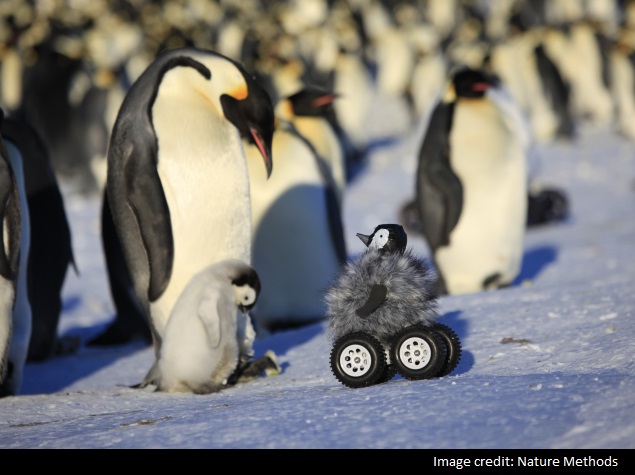- Home
- Science
- Science News
- Penguin Robot Is a Happy Feat for Science
Penguin Robot Is a Happy Feat for Science

The infiltration is for a good cause: the cute and fluffy robot is a remote-controlled spy designed by scientists wishing to monitor the skittish penguins without causing them stress.
An international team tested the rover, with and without the fake chick addition, on king penguins on Possession Island in the Indian Ocean, and on Emperor penguins in Antarctica.
They reported in the journal Nature Methods on Sunday that both versions caused much less alarm, measured by penguin heart rate and behaviour, than a human presence and the lookalike could get much closer.
The rover was fitted with an antenna to read the signals from electronic ID tags fitted to some of the birds for population research.
The tags cannot be read beyond a distance of 60 centimetres (24 inches).
"When the rover was camouflaged with a penguin model, all adult and chick emperor penguins allowed it to approach close enough for an electronic identification," they wrote.
"Chicks and adults were even heard vocalising at the camouflaged rover, and it was able to infiltrate a creche without disturbance."
A picture of the penguin-bot shows a ball of fluff complete with flippers, sharp beak and face painted in the distinct black-and-white colouring of Emperor penguin chicks perched on top of a small frame with four wheels.
In another image, the little robot is in a tight huddle of baby penguins supervised by groups of adults.
The rover, still being refined, is meant to shed more light on the breeding patterns and behaviour of penguins, good indicators of the health of marine resources in the Southern Ocean.
In the past, scientists had attached transponders to the penguins' wings.
These could send signals over much longer distances, but researchers soon discovered they hamstrung the penguins in swimming, impairing breeding and hunting.
Nowadays, a tiny chip that weighs less than a gramme (0.03 ounces) is inserted under the skin.
But it has a much shorter range and has thus far necessitated scientists entering penguin colonies to obtain the data they want.
The new rover may lead to "more ethical research that also avoids the scientific bias caused by disturbing the animals in their natural habitat," said study co-author Yvon Le Maho of France's University of Strasbourg.
Get your daily dose of tech news, reviews, and insights, in under 80 characters on Gadgets 360 Turbo. Connect with fellow tech lovers on our Forum. Follow us on X, Facebook, WhatsApp, Threads and Google News for instant updates. Catch all the action on our YouTube channel.
- Samsung Galaxy Unpacked 2026
- iPhone 17 Pro Max
- ChatGPT
- iOS 26
- Laptop Under 50000
- Smartwatch Under 10000
- Apple Vision Pro
- Oneplus 12
- OnePlus Nord CE 3 Lite 5G
- iPhone 13
- Xiaomi 14 Pro
- Oppo Find N3
- Tecno Spark Go (2023)
- Realme V30
- Best Phones Under 25000
- Samsung Galaxy S24 Series
- Cryptocurrency
- iQoo 12
- Samsung Galaxy S24 Ultra
- Giottus
- Samsung Galaxy Z Flip 5
- Apple 'Scary Fast'
- Housefull 5
- GoPro Hero 12 Black Review
- Invincible Season 2
- JioGlass
- HD Ready TV
- Latest Mobile Phones
- Compare Phones
- Tecno Pova Curve 2 5G
- Lava Yuva Star 3
- Honor X6d
- OPPO K14x 5G
- Samsung Galaxy F70e 5G
- iQOO 15 Ultra
- OPPO A6v 5G
- OPPO A6i+ 5G
- Asus Vivobook 16 (M1605NAQ)
- Asus Vivobook 15 (2026)
- Brave Ark 2-in-1
- Black Shark Gaming Tablet
- boAt Chrome Iris
- HMD Watch P1
- Haier H5E Series
- Acerpure Nitro Z Series 100-inch QLED TV
- Asus ROG Ally
- Nintendo Switch Lite
- Haier 1.6 Ton 5 Star Inverter Split AC (HSU19G-MZAID5BN-INV)
- Haier 1.6 Ton 5 Star Inverter Split AC (HSU19G-MZAIM5BN-INV)


![[Partner Content] OPPO Reno15 Series: AI Portrait Camera, Popout and First Compact Reno](https://www.gadgets360.com/static/mobile/images/spacer.png)









